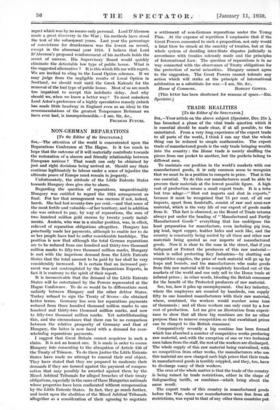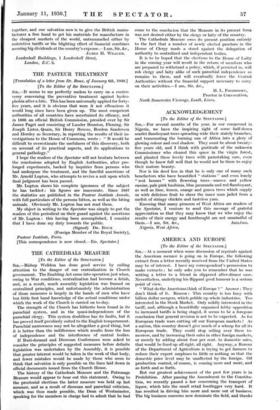TRADE REALITIES
[To the Editor of the SrEcreTon.] Sm,—Your article on the above subject (Spectator, Dec. 218 ), has broached a phase of the vital trade question which it is essential should be made clear, if at all possible, to the uninitiated. From a very long experience of the export trade to all parts of the world,. I think I can say that the whole thing can be reduced to simple mathematics. The export trade of manufactured goods is the only trade bringing wealth into the country : the Home trade is merely shuffling the pieces from one pocket to another, but the pockets belong to different men.
To maintain our position in the world's markets with our manufactured goods, it is' only common sense to recognize that we must be in a position to compete in price. That iS the one essential. To do this our manufacturers must be able to procure their materials at the lowest possible figure. A high cost of production means a small export trade. It is a trite but true adage—" Shut out imports and shut in exports," because it must be recognized that 75 per cent. of all our imports, apart from foodstuffs, consist of raw and semi-raw material, which is the very life of our export of goods matte from it. This fact is obscured, as the Board of Trade returns always put under the heading of " Manufactured' and Partly Manufactured Good§ " everything that has undelitone the least preparation for manufacture, even including pig iron, pig lead, ingot copper, leather hides and such like, and the country is constantly being misled by all these and other raw materials being quoted as our imports of manufactured goods. Now it is clear to the man in the street, that if you Safeguard or Protect the producers of this raw material— which is called protecting Key Industries—by shutting out competitive supplies, the price of such material will go up by leaps and bounds, and the manufacturers who make goods from this raw material will be completely knocked out of the markets of the world and can only sell to the Home trade at inflated prices ; in other words, bleeding the British consumer for the benefit of the Protected producers of raw material.
See, too, how it piles up unemployment. One key industry, where the employees are counted by hundreds, can supply fifty to one hundred manufacturers with their raw material, where, combined, the workers would number some tens of thousands ; and all these workers can only exist by a low cost of production. Let me give an illustration from experi- ence to show that all these big combines are for no other purpose than to remove competition so that exorbitant prices can be charged to the British consumer.
Comparatively recently a big combine has been formed which has absorbed a number of competitive works producing raw material, and,with the exception of one or two technical men taken from the staff, the rest of the workers are discharged. The whole supply of this raw material being centralized, with no competition from other works, the manufacturers who use this material are now charged such high prices that their trade in manufactured goods is terribly crippled, and they, too, have to discharge many of their workers.
The crux of the whole matter is that the trade of the country is being ruined by trade restrictions, either in the shape of Safeguarding tariffs, or combines—which bring about the same result.
The export trade of this country in manufactured goods before the War, when our manufacturers were free from all restrictions, was equal to that of any other three countries put
together, and our salvation now is to give the British manu- facturer a free hand to get his materials for manufacture in the cheapest markets of the world, untrammelled either by restrictive tariffs or the blighting effect of financial combines securing big dividends at the country's expense.—I am, Sir, &c., JAMES H. 'WEAGER. Leadenhall Buildings, 1 Leadenhall Street, London, B.C. 3.







































 Previous page
Previous page